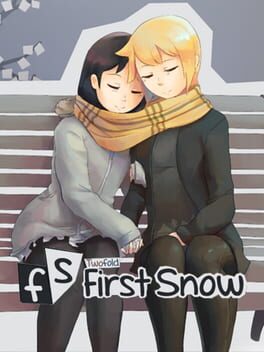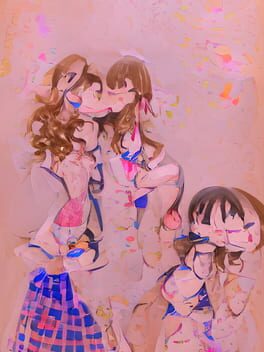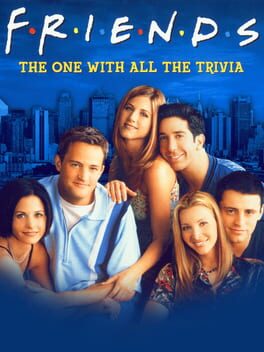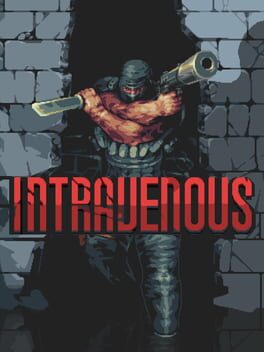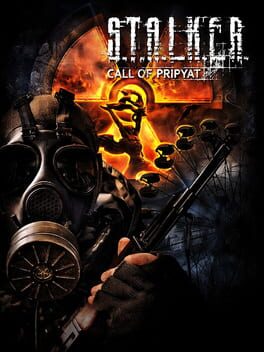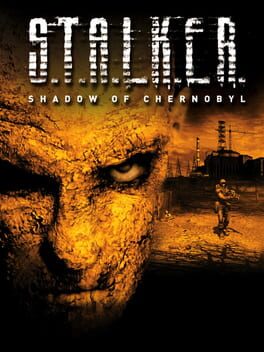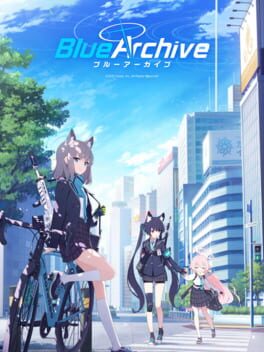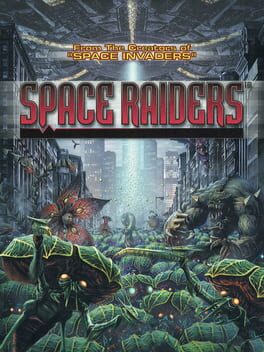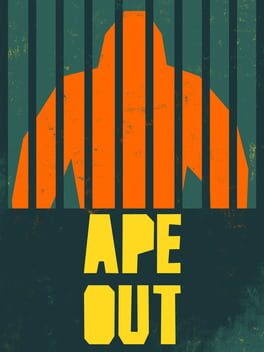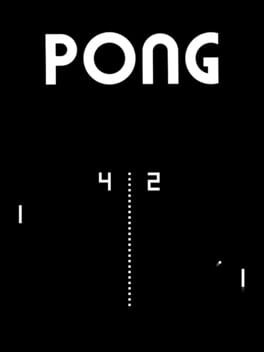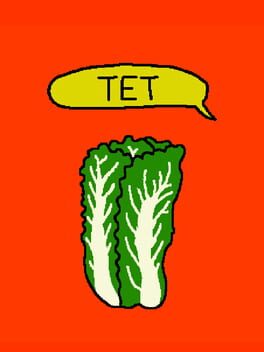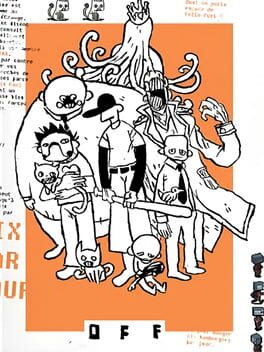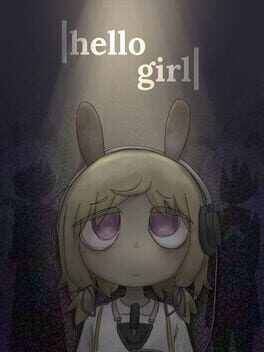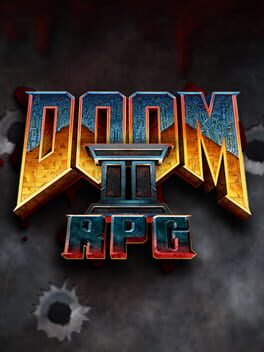HurtingOtherPPl
2020
2020
It looks pretty. The UI is visually pleasing and the stylized 3D animations give the game its own unique charm. With different music and less annoying voices, this could have been a very aesthetically coherent title.
However, just like some meetings could have been e-mails, this videogame could have been a card game. Its existence is unnecessary.
However, just like some meetings could have been e-mails, this videogame could have been a card game. Its existence is unnecessary.
2021
What's the point in creating a system that allows for fun and challenging combat scenarios if you'll do everything in your power to keep the player from engaging with it? Why does the player carry a gun, anyway? You'll spend 90% of your time walking around an empty landscape and shooting at dumb quadrupeds who run at you in a straight line.
The combat during the first fourth of the game is really fun. Both you and your enemies are fragile, so you're forced to either keep yourself mobile or find a good point of advantage in the battlefield, thus engaging critically with the level design. As the game progresses, everyone becomes a tank and your extra resistance trivializes shootouts. The game becomes tensionless. You can't ditch armor entirely either because encounters are designed around this extra resistance. It's only fun to be vulnerable when your enemies are just as weak, not so much when they can take two shotgun shells to the chest.
The atmosphere is well crafted, but in service of a boring poorly-told story. I don't think this game should use the Stalker name, since it takes the original concept and twists it into a shooting gallery loosely tied by a nothingburger plot.
The atmosphere is well crafted, but in service of a boring poorly-told story. I don't think this game should use the Stalker name, since it takes the original concept and twists it into a shooting gallery loosely tied by a nothingburger plot.
2021
1999
Some of the most memorable moments in Silent Hill come not from the settings and key events themselves, but from the contrast between them. It's a very unique sensation when you first leave the nightmare reality. You're expelled from this rusty claustrophobic hellscape into an empty silent world. A world you've seen before but are not quite familiar with. One which is frozen in time. You're so used to a corrupted version of the scene that seeing it in its normal state is almost nostalgic. In a sense, you're also frozen in time while populating this space, as it is the calm both before and after the storm.
This works because the gameplay forces you to have a deep connection to the setting. You are always either looking for something or planning an optimal route to the next objective, you have to think of Silent Hill as a space with real consequences and pay close attention to its details so as not to miss important items or clues. You are forced to cross-relate spaces and events in order to progress: a clue on a random part of the town will reference a point in the map and a locale on the physical 3D area, which will make you consider the pathways you’ll take, where you’ll want to stop, what enemies you’re willing to fight, along other relative factors. Silent Hill demands the player to pay attention and to stay engaged. Eventually, you start naturally thinking in the game’s logic and internalizing the space as real.
The abundance of enemies in relation to your ammo and health item pools contributes to the reasoning in gameplay (otherwise you’d simply shoot everything and make no effort to consider your traversal). However, resources aren’t limited enough to create tension. You have more than enough bullets for every weapon at all times (if you pick your fights wisely) and getting hurt is never a concern with the amount of health items the game offers you. You’re always given much more than you need to get by, which removes the tension from the encounters and directs you to a boring, inconsiderate playstyle. It doesn’t matter if you get hit or if you waste ammo, since there are always enough items to keep you safe. You have to force yourself to care about hazards (even though they aren’t threatening) in order to engage with each combat scenario in interesting ways that don’t boil down to “stand and shoot” or “run”. If you had less ammo and melee weapons were wors, you’d have to make interesting decisions. Consider the following situation:
-There are two enemies approaching you. The lack of healing items makes you want to avoid damage, your shotgun ammo is too scarce to be used right now and you have to use as few bullets as possible. You shoot the closest enemy three times and equip a melee weapon to finish it off. You don’t have to focus on two monsters at once, so you can move onto the next one with only your melee weapon.
With an overabundance of resources, the encounter looks like this:
-There are two enemies, you shoot both with the shotgun. Or you shoot both with the pistol and take some damage, but it doesn’t matter because you have 60 thousand health drinks.
The player isn’t motivated to actively consider each encounter. It’s a shame. The game is too forgiving. Otherwise, you’d be forced to pay attention to your moveset, to the monster’s behavior and to your weapon’s characteristics.
At least you can say that Silent Hill is a game that recognizes its limitations. The awkwardness of the controls is mitigated by encounters designed to not demand what can’t be easily performed. You usually don’t have to keep more than two enemies in mind and the game expects to run away from every situation involving more than three foes. Key entrances and items are cleverly framed by a fixed camera, so you’re not left wondering what you’re supposed to do and the heavy immersive atmosphere isn’t shattered.
2002
The cop looks like Nicolas Cage if he was black
https://imgur.com/a/KqwxFbV
https://imgur.com/a/KqwxFbV
2019
How can you not be enraged? You’ve been trapped in a small box with barely enough room to move your limbs. They’ve kept torturing you, hurting you, pushing you to your limit. No attempt to communicate, no interest in harmony. Nothing but violence comes from your oppressors. You weren't born to be trapped. Nature can only be encased for so long before it bursts. Well, let’s answer in a language they understand.
Death.
The tension that has accumulated from all the bruises culminates in your first thrust. Continuous climax. It’s either you or them now, no time to think about consequences. There’s never enough time. Behind your motions, the weight of a 250kg beast. Thunderous percussion reverberates with every step. Legs are drums, arms are cymbals, your body is consolidated as an instrument of rage and power. A tool necessary, as it’s the entire world against your freedom. You’ve got to have freedom.
Power.
What are bullets to a being who denies death? The roles are flipped here, you become the unavoidable force. Quite literally, you turn their own guns against them. Behind your wake are pools of blood and flesh. Some of it yours, most of it theirs. The fight for freedom will never be a painless process. And yet, you power through your wounds. Your rage does not care about their weapons and structures. Their society is meaningless. You will force the rules of nature upon this hostile environment.
Freedom.
The drums, your heartbeat, have accompanied your tireless struggle. Continuously rising tension, building towards a climax but not quite reaching it. That is, until you break through the final enclosure. Like the resolution to an out-of-tune note in jazz, your release justifies every second of this fight. The incessant drums lead into a cathartic and desperate saxophone. Your rage and determination pay off. Nothing can contain you anymore. Freedom at last.
If only all humans had as much fury and willpower in their hearts. They would free themselves from their own captors.
Death.
The tension that has accumulated from all the bruises culminates in your first thrust. Continuous climax. It’s either you or them now, no time to think about consequences. There’s never enough time. Behind your motions, the weight of a 250kg beast. Thunderous percussion reverberates with every step. Legs are drums, arms are cymbals, your body is consolidated as an instrument of rage and power. A tool necessary, as it’s the entire world against your freedom. You’ve got to have freedom.
Power.
What are bullets to a being who denies death? The roles are flipped here, you become the unavoidable force. Quite literally, you turn their own guns against them. Behind your wake are pools of blood and flesh. Some of it yours, most of it theirs. The fight for freedom will never be a painless process. And yet, you power through your wounds. Your rage does not care about their weapons and structures. Their society is meaningless. You will force the rules of nature upon this hostile environment.
Freedom.
The drums, your heartbeat, have accompanied your tireless struggle. Continuously rising tension, building towards a climax but not quite reaching it. That is, until you break through the final enclosure. Like the resolution to an out-of-tune note in jazz, your release justifies every second of this fight. The incessant drums lead into a cathartic and desperate saxophone. Your rage and determination pay off. Nothing can contain you anymore. Freedom at last.
If only all humans had as much fury and willpower in their hearts. They would free themselves from their own captors.
1972
2023
2008
2023
The history of humanity is a timeline of suffering, cruelty and violence. The innocent people affected by these contexts may search for meaning; may try to find an explanation as to why their loved ones keep having pain inflicted upon them by forces outside of their control. Some turn to nationalism (“we are nobly defending our country”), some turn to religion (“It’s all what God intended”). In truth, war, death, tragedy, it’s all utterly meaningless. Lies are told to you, through the media you consume or through political discourse, that soldiers are fighting for democracy, for freedom. No, they are dying and murdering for the interests of the elite, almost always. Left alive are broken humans searching for meaning where there is none. If you live relatively comfortably, you may not have realized that life is disposable under the metric determined by society’s ruling forces. When you realize the inherent lack of justification for suffering, it’s easy to lose faith in humanity, to believe true connection is impossible and that all people, at heart, are selfish husks who operate based on their egotistical needs.
Hello Girl opens with a disembodied voice claiming that people are tools who serve others’ needs. Your employer sees you for your labour, your government sees you as a statistic. Even your lover doesn’t really love you, they love the feeling that comes from your affection. True connection doesn’t exist, she claims, and the world outside of your individual perception is fake, Unreal (1998), meaningless. By the end, this character sacrifices her sense of self, as her body is literally destroyed, to become “real” and embody the image of an idol, someone known by thousands. Therefore, she only exists when someone is looking at her. Who is real, then? Her true self or her fabricated image? This story proves this way of thinking is flawed.
Ana’s existence is paradoxical. She is a switch operator, a “Hello Girl” responsible for connecting people, while occupying a job that doesn’t involve human interaction. She serves as a bridge for communication, but her time is spent alone, shut off from society. Ana lives in an abandoned workplace full of empty rooms kept purposefully locked, as she’s too afraid to witness anything that could remind her of other people. She is a spectre who can do nothing but observe a world indifferent towards her. This is reinforced by the fact that she and her sister Clara are interchangeable to the eyes of her employer, her identity is muted. She embraces her insignificance and accepts a life away from other people’s vision, perhaps as a way to escape the horrors of the reality around her. Losing Clara, her only true connection was extinguished and her sense of “real existence” was damaged. If you live alone for too long, you might start to wonder if anyone would care about you at all, which is why Ana is so surprised when Courier shows compassion and empathy towards her. Courier attempts to officialize Ana’s existence by registering her at her job, but, ultimately, achieves that by developing a relationship with her. In an universe of incomprehensible cruelty of unmanageable proportions, stability is found through love and self-realization.
Becoming real is not becoming an idol, achieving an image known by thousands. To become real, you must live with yourself, live with another person, cause change and allow yourself to be changed. It’s important to note that love is not about feeling what someone is feeling, but feeling with them. As it is articulated in The Holy Mountain: “We came in search of the secret of immortality, to be like Gods. And here we are, mere mortals. If we have not obtained immortality, at least we have obtained reality” (https://youtu.be/0dX75e9LS60?si=4kupjXfG7iESG_nS). We live in our connections and in the messages we share with the world, but being alone isn’t abandoning existence. Your individuality is what makes you human, it’s what makes these connections genuine in the first place. In an age where the constructed image is becoming more relevant than the individual essence, it’s important to remember that.
Hello Girl opens with a disembodied voice claiming that people are tools who serve others’ needs. Your employer sees you for your labour, your government sees you as a statistic. Even your lover doesn’t really love you, they love the feeling that comes from your affection. True connection doesn’t exist, she claims, and the world outside of your individual perception is fake, Unreal (1998), meaningless. By the end, this character sacrifices her sense of self, as her body is literally destroyed, to become “real” and embody the image of an idol, someone known by thousands. Therefore, she only exists when someone is looking at her. Who is real, then? Her true self or her fabricated image? This story proves this way of thinking is flawed.
Ana’s existence is paradoxical. She is a switch operator, a “Hello Girl” responsible for connecting people, while occupying a job that doesn’t involve human interaction. She serves as a bridge for communication, but her time is spent alone, shut off from society. Ana lives in an abandoned workplace full of empty rooms kept purposefully locked, as she’s too afraid to witness anything that could remind her of other people. She is a spectre who can do nothing but observe a world indifferent towards her. This is reinforced by the fact that she and her sister Clara are interchangeable to the eyes of her employer, her identity is muted. She embraces her insignificance and accepts a life away from other people’s vision, perhaps as a way to escape the horrors of the reality around her. Losing Clara, her only true connection was extinguished and her sense of “real existence” was damaged. If you live alone for too long, you might start to wonder if anyone would care about you at all, which is why Ana is so surprised when Courier shows compassion and empathy towards her. Courier attempts to officialize Ana’s existence by registering her at her job, but, ultimately, achieves that by developing a relationship with her. In an universe of incomprehensible cruelty of unmanageable proportions, stability is found through love and self-realization.
Becoming real is not becoming an idol, achieving an image known by thousands. To become real, you must live with yourself, live with another person, cause change and allow yourself to be changed. It’s important to note that love is not about feeling what someone is feeling, but feeling with them. As it is articulated in The Holy Mountain: “We came in search of the secret of immortality, to be like Gods. And here we are, mere mortals. If we have not obtained immortality, at least we have obtained reality” (https://youtu.be/0dX75e9LS60?si=4kupjXfG7iESG_nS). We live in our connections and in the messages we share with the world, but being alone isn’t abandoning existence. Your individuality is what makes you human, it’s what makes these connections genuine in the first place. In an age where the constructed image is becoming more relevant than the individual essence, it’s important to remember that.
2009
